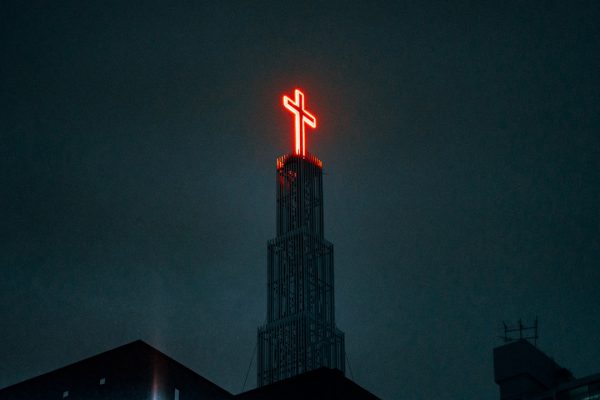For I do not want you to be unaware, brothers, that our fathers were all under the cloud, and all passed through the sea, and all were baptized into Moses in the cloud and in the sea, and all ate the same spiritual food, and all drank the same spiritual drink. For they drank from the spiritual Rock that followed them, and the Rock was Christ. Nevertheless, with most of them God was not pleased, for they were overthrown in the wilderness. Now these things took place as examples for us, that we might not desire evil as they did (1 Corinthians 10:1-6)
One of Paul’s primary aims in his first letter to the church at Corinth is to help them understand who they are in Christ, where they are on God’s timetable in redemptive history, and how they ought to live in light of it. The Corinthian Christians are actors in God’s drama of redemption, and they need to not only know their characters and what act they are in, but also what has gone on before and how characters in earlier acts got things seriously wrong, in order to act faithfully in the present. This is what Paul is doing in 1 Corinthians 10.
Paul is about to land the plane in his discussion of food offered to idols and eaten in idol temples (1 Cor. 10:14-11:1). But before he does, he warns the Corinthians who think that their freedom in Christ means they are in no longer in danger of failing and falling. Paul’s warning in chapter 10 is connected like a hinge to what Paul just said about the Corinthians running the race to receive the prize and not to be disqualified (1 Cor. 9:24-27). Why should the church be exhorted to run and not be disqualified? Because there are examples in Scripture, of people who did just that, and Paul wants them to see the pattern of Israel’s history and to heed the warning of Israel’s failure. As Christians today, part of the new Israel, renewed and restored in Christ Jesus, we too must consider the experiences of Israel in the exodus to better understand our own situation and avoid the dangers of idolatry.
See the Pattern of Israel’s History
Despite their knowledge, Paul does not want them to be unaware of their connection to Israel and the parallels between their experiences as God’s people. Paul already made this connection when he called Jesus the Passover lamb, whose sacrificial death accomplished a greater exodus (1 Cor. 5:7). Now, Paul insists that Christians are “the true Passover-people, the true Exodus people.”1Tom Wright, Paul for Everyone: 1 Corinthians (London: Society for Promoting Christian Knowledge, 2004), 125. He wants them to see the continuity between Israel and the church, and the significance of it.
In recounting the story of the exodus, Paul (a Jew) calls the Corinthian church his brothers, a church of Jews and Gentiles! The familial language Paul uses implies that they have a shared ancestry: “our fathers” (1 Cor. 10:1). Thus, the church, God’s new covenant people, is a continuation of God’s old covenant people, part of the same family. The Corinthians are, along with believing Jews, God’s new people in Christ, restored Israel, the Israel of God (Gal. 6:16). Israel’s history is their history. This means that the church has not “replaced” Israel in God’s plan; rather, Jesus the Messiah “fulfils and completes what Israel was called to be, and all those who belong to the Messiah are now God’s people, heirs of Abraham, Isaac, Jacob and the people of the Exodus.”2Wright, Paul for Everyone: 1 Corinthians, 125.
Israel’s “Baptism”: the Cloud and the Sea
Paul also wants them to see that the experiences of Israel prefigured their own experiences as God’s people. First, Israel, like the Corinthians, had a “type” of baptism: “our fathers were all under the cloud, and all passed through the sea, and all were baptized into Moses in the cloud and in the sea” (1 Cor. 10:1-2). This of course refers to the exodus, with the cloud and sea representing God’s power and presence. The exodus was the event which “created” Israel; their history effectively began with God delivering them from slavery in Egypt and bringing them into covenant with himself. This is why being “under the cloud” and passing “through the sea” is interpreted as a “baptism.” It was not traditionally understood that way, but now, in light of Christ, Paul calls it one. The Christian life, as God’s covenant people, begins with baptism into Christ, being led by God’s indwelling Spirit, and coming under the leadership (Lordship) of Jesus.
Paul is reminding the Corinthians that they have experienced the blessings of God’s power and presence just like Israel. But while the experiences are similar, they are not the same. The first exodus may have established god’s people, but the greater exodus in Christ is what those events pointed to all along. Those events find their fulfillment and culmination in Christ.
Israel’s “Lord’s Supper”: Mana and Water from the Rock
Second, Israel, like the Corinthians had a “type” of the Lord’s Supper: “…and all ate the same spiritual food and all drank the same spiritual drink” (1 Cor. 10:3-4). While the cloud and sea represent God’s presence and power, the food and drink refer represent God’s supernatural provision of mana and water which sustained them in the wilderness (Ex. 16-17). Based on the idea of the exodus as a baptism, and Paul’s instructions on the Lord’s Supper (1 Cor. 10:14-22; 11:17-34), we can see what Paul is getting at: Israel’s nourishment by God after their “baptism” parallels/prefigures the church’s nourishment by Christ in the Lord’s Supper.
The “for” in verse four explains how the drink was spiritual: “for they drank from the spiritual Rock that followed them, and the Rock was Christ” (1 Cor. 10:4). There are two things to notice here. First, the spiritual Rock that followed (accompanied) them is an allusion God providing water from the rock at Rephidim (Ex. 17) and again in Kadesh (Num. 20). In Jewish tradition, the rock was said to actually follow them on their journey. However, Paul’s point is probably that God accompanied and sustained them, because God is the Rock of Israel (Deut. 32). Whether the same rock followed them, or God made water spring up from different rocks, the point is that Yahweh, the Rock of Israel (Deut. 32) accompanied them and sustained them every step of the way.
Second, Paul says that this rock was Christ. This does not mean the Son of God was incarnate as a “rock” who followed Israel “in disguise” as it were. More likely, Paul is attributing to Jesus what is attributed to YHWH in the OT. Jesus, as the eternal Son of God, “saved a people out of the land of Egypt” (Jude 5) and was with his people, leading them, and providing for them. The pre-incarnate Christ is the Angel of the Lord, the One at the top of Jacob’s Ladder (John 1:51), the Fourth Man in the fire, the one whom the prophets saw (Isa. 6; Ezek 1; Dan. 7; John 12:41; Rev. 1:9-20). If Jesus was the Rock that followed them, then the story of the rock being struck in the wilderness is yet another OT story that points gospel, because Jesus was struck, and from him flows living water for all to drink (John 7:37-39). Bruce Winter sums it up well:
“The One who was there at the beginning and was the agent of creation (Jn. 1:2–4), and who upholds all things (Col. 1:17), was actively involved in the life of God’s people in OT times just as he is involved in the lives of Christians today. The second person of the Trinity did not suddenly appear for the first time at the incarnation.”3Bruce Winter, “1 Corinthians,” in New Bible Commentary: 21st Century Edition, ed. D. A. Carson et al., 4th ed. (Leicester, England; Downers Grove, IL: Inter-Varsity Press, 1994), 1176.
Heed the Warning of Israel’s Failure
Why does Paul highlight their connection to Israel? Why make these connections to the cloud, the sea, the food, the drink? So they can heed the warning of Israel’s failure. “Nevertheless, with most of them God was not pleased, for they were overthrown in the wilderness” (1 Cor. 10:5). There is a contrast here between “all” (1-4) and “most of them” (5). While all experienced God’s power, presence, and provision, that did not keep many of them from experiencing God’s judgment because of their rebellion and idolatry and being “overthrown” (Num. 14:16).
Then in verse 6 Paul sums it up: “Now these things took place as examples for us that we might not desire evil as they did” (1 Cor. 10:6) The word for example is the word for “pattern” or “type.” Paul is saying these events in Israel’s history were patterns or types that correspond to future events, from which we should learn. This is background for the study of “typology” which is “God-ordained, author-intended historical correspondence and escalation in significance between people, events, and institutions across the Bible’s redemptive-historical story.”4James M. Hamilton Jr., Typology-Understanding the Bible’s Promise-Shaped Patterns: How Old Testament Expectations are Fulfilled in Christ (Zondervan, 2022,) 26. The prophets saw Israel’s restoration in terms of an exodus and new creation, and that is exactly how Jesus understood his ministry as well. Jesus even said that the hard-hearted Pharisees, who rejected his message, were like the hard-hearted generation in Isaiah’s day, who rejected Isaiah’s message (Matt. 13). Isaiah’s generation prefigured the Pharisees. Isaiah’s generation was “type,” the Pharisees were the culmination and fulfillment of that type (“antitype”). Paul also says elsewhere that Adam was a “type” of the one who was to come (Rom. 5:14). Typology shows how Jesus is the second, the true and better Adam.
The history of Israel, with all its people and events, were patterns and paradigms to help form us and warn us. We are supposed to look to our history, learn from it, and let it shape us. The writer to the Hebrews does a similar thing. He talks about the wilderness generation failing to enter their rest, and then exhorts Christians to not make the same mistake (Heb. 3:7 – 4:13). Likewise, Jude writes, “Now I want to remind you, although you once fully knew it, that Jesus, who saved a people out of the land of Egypt, afterward destroyed those who did not believe” (Jude 5). If the Corinthians do not flee idolatry, despite receiving the power, presence, and provision of Jesus Christ, they will only succeed in provoking the Lord to jealousy, as Israel did (1 Cor. 10:14, 22).
Israel prefigures the church in their “baptism” and their heavenly meal, but we must make sure that they do not prefigure us in their idolatry as well.




